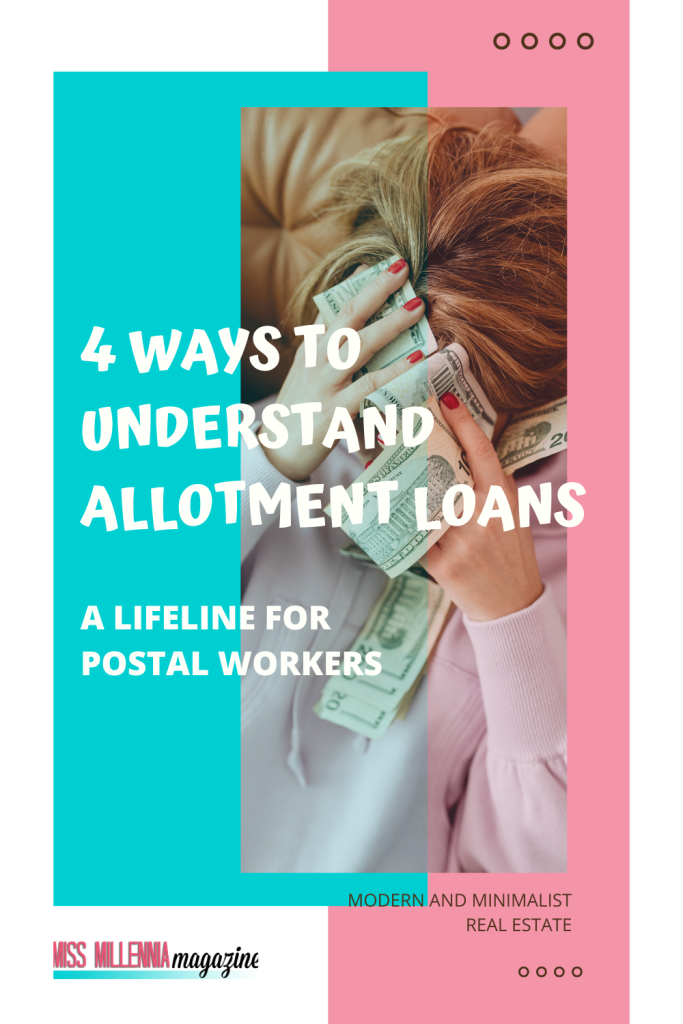4 Ways to Understand Allotment Loans: A Lifeline for Postal Workers

Financial challenges can strike anyone, and postal workers are no exception. However, having a poor credit score can make accessing the funds you need even more challenging when faced with an unexpected expense or an emergency. Allotment loans for postal employees with no credit check required can be a lifeline for those in such situations.
This comprehensive guide will help you understand the ins and outs of allotment loans, weigh their pros and cons, and explore alternative financial solutions. By providing practical, actionable tips, we aim to empower postal employees to make informed decisions about their finances and regain control of their economic well-being.
Understanding Allotment Loans: A Lifeline for Postal Workers
Allotment loans are a type of personal loan specifically tailored for federal employees, including postal workers. Designed to provide quick access to funds, these loans do not require a credit check, making them an attractive option for those with bad credit. The unique repayment structure and lack of credit checks make allotment loans a potential lifeline for postal employees in need of emergency funds but struggling with bad credit.

By offering a financing solution that doesn’t involve the challenges of traditional loans, which often require credit checks and stringent eligibility criteria, allotment loans allow postal workers to address their financial needs without further complicating their situation.
The Mechanics of Allotment Loans for Postal Employees
The loan application process for allotment loans is relatively straightforward, typically involving an online or in-person application and submitting the necessary documentation, such as proof of employment and recent pay stubs. Once the application is submitted, the approval process is generally quick, allowing borrowers to access funds in a short amount of time. It is essential to compare different lenders that offer allotment loans and carefully review their interest rates, fees, and terms before applying.
The payroll deduction repayment method is a crucial aspect of allotment loans for postal employees. By automatically deducting loan repayments from the borrower’s paycheck, this method ensures timely payments and minimizes the risk for the lender. This convenience, in turn, allows lenders to offer loans without credit checks. However, borrowers need to be aware of the repayment terms, as the automatic deductions can impact their take-home pay and potentially cause financial strain if not managed correctly.
Evaluating the Pros and Cons: Is an Allotment Loan Right for You?
When considering an allotment loan, weighing the advantages and disadvantages is crucial to determine if it’s the right choice for your financial situation.
Advantages of allotment loans for postal workers with bad credit include:
- Accessibility: The no credit check requirement allows postal employees with poor credit to obtain funds without being denied due to their credit score.
- Easy repayment: Automatic payroll deductions make managing repayments easier and reduce the risk of missed payments.
- Quick approval: The approval process for allotment loans is typically fast, enabling borrowers to access funds quickly during emergencies.
However, allotment loans also come with potential disadvantages and risks:
- Higher interest rates: Due to the increased risk for lenders, allotment loans often carry higher interest rates than traditional personal loans. According to Steven Hill of Sound Financial, an APR of just 175% can cost you $283.84 on a $500 loan – a significant risk.
- Limited loan amounts: The amount a borrower can receive may be limited based on their income and ability to repay the loan, which might not be sufficient to cover their financial needs.
- Potential for overborrowing: The ease of obtaining these loans can lead some borrowers to overextend themselves, resulting in increased debt and financial strain.
By carefully evaluating the pros and cons of allotment loans, postal employees can decide whether this financial option aligns with their needs and circumstances.
Step-by-Step Guide: Applying for an Allotment Loan
To apply for an allotment loan, follow these steps to increase your chances of approval and find a loan that best suits your financial needs:
- Researching lenders: Start by comparing different lenders that offer allotment loans to postal employees. Look for lenders with competitive interest rates, reasonable fees, and favorable terms. Reading reviews and testimonials from other borrowers can also provide insights into the lender’s customer service and reliability.
- Preparing necessary documentation: Gather the required documents for your loan application. These may include proof of employment, recent pay stubs, identification, and any additional information the lender may request. Having your documentation organized and ready can help streamline the application process.
- Submitting the application and awaiting approval: Complete the loan application form, either online or in-person, and submit it along with the necessary documentation. Ensure that you provide accurate and complete information to avoid delays in the approval process. Once your application is submitted, you must wait for the lender’s decision. If your loan is approved, review the terms and conditions carefully before accepting the loan. For example, ensure you understand the interest rate, repayment schedule, and any fees associated with the loan.
By following these steps, you can navigate the application process for an allotment loan more efficiently and increase your chances of securing a loan that meets your financial needs.
Exploring Alternatives: Other Financial Solutions for Postal Workers
While allotment loans can be a helpful solution for some postal employees with bad credit, it’s essential to explore other financial alternatives to find the best option for your specific situation:
- Credit unions for federal employees: Some credit unions cater specifically to federal employees, offering loans with lower interest rates and more flexible terms than allotment loans. Joining a credit union and exploring its loan options can provide a more affordable and customized solution to your financial needs.
- Secured loans: Secured loans require collateral, such as a car or a home, to ensure the loan. Because the lender has collateral to fall back on in case of default, they are more likely to approve the loan and offer lower interest rates, even for borrowers with bad credit. However, remember that you risk losing your collateral if you fail to repay the loan.
- Personal loans from friends or family: Borrowing money from friends or family can be a viable alternative to allotment loans. This option often comes with lower interest rates and more flexible repayment terms. However, borrowing from loved ones can strain relationships, so it’s crucial to be transparent about the terms and ensure timely repayments.
- Debt management and credit counseling services: If your financial difficulties stem from mounting debt, you may benefit from seeking professional assistance. Debt management and credit counseling services can help you develop a plan to address your debt, negotiate with creditors, and establish a budget to improve your financial situation. In addition, these services can provide long-term solutions and help you regain control of your finances.
By exploring these alternatives to allotment loans, postal employees can make a well-informed decision and choose the financial solution that best aligns with their needs and circumstances.
Final Verdict
In conclusion, allotment loans can be a valuable resource for postal employees struggling with bad credit who need access to emergency funds. However, it’s essential to carefully weigh the benefits and drawbacks of these loans and explore alternative financial solutions to determine the best course of action for your unique situation. By understanding the mechanics of allotment loans, evaluating their pros and cons, and considering other financial options, you can make an informed decision that supports your economic well-being.
Remember that seeking professional financial advice or credit counseling can also provide long-term solutions to help you regain control of your finances and build a more secure financial future.







